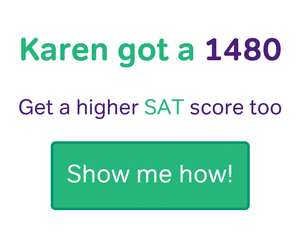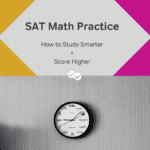
You’re struggling to get a score that you feel happy with on the new SAT math section, and you start having some serious doubts about your chances at getting into your dream school.
Maybe the new SAT math just isn’t your thing, or perhaps you’re having trouble understanding the phrasing and terminology since English is your second language. Some students do better under the pressure of test-taking situations than others.
Whatever the case may be, there is a way to get over the 500 hump if you really work at it, and it doesn’t involve studying for the next year to get there.
Focus on the Easy Problems
The new SAT math is comprised of problems with a wide range of difficulty. The hard ones involve multiple steps and potentially difficult language to parse. The easy ones are usually just plug-and-chug type of questions. These kinds of questions are more straightforward and don’t involve critical thinking to figure out.
The key is to zone in and just study up on getting the easy ones right. Here is a list of the easiest math concepts to brush up on:
1. Linear Equations and Graphs. These kinds of problems make up the basic foundation of the “Heart of Algebra” section on the new SAT math. Many of these problems only involve a few steps to solve for X or match up a graph to the equation, so it’s a great opportunity to score easy points here.
2. Scatterplots, Data, and Tables. Being able to quickly break down a chart doesn’t require a lot of advanced math, but it’s an important skill to know. You will be rewarded handsomely if you are proficient at this.
3. Mean, Median, and Mode. Many of you might remember these concepts from elementary school, but surprisingly, you will see it on the SAT! This is an easy way to get points on the SAT, so take advantage of it.
4. SOHCAHTOA. This is an acronym that will only take you a minute or two to memorize but is so useful on the test. Problems that involve a missing side length or angle measure will become cakewalk for you.
5. Inequalities. It’s similar enough to a standard equation that it shouldn’t involve too much effort on your part to grasp. The important thing to remember here is to be careful to make sure that you are careful about having your signs point the right way.
6. Right Triangles. This goes hand in hand with learning the basic trig functions, so it’s necessary to know your basics like the Pythagorean Theorem and the special right triangles.
7. Complex Numbers. Don’t be fooled by the name; it’s fairly simple to learn how complex numbers work. Since the test makers can only present this concept in a very limited number of ways, it’s worth learning even if it doesn’t come up on the test as often as a simple algebra problem.
Stay Motivated and Study Hard
Don’t be discouraged if math isn’t your strongest subject. Just by working on going after the low-hanging fruit, you’ll still be able to achieve a respectable score on the new SAT math section.






Leave a Reply